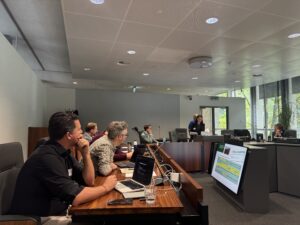British tech expert and Uber driver James Farrar has been championing labour rights in the platform economy for eight years. Often successfully. Platform expert Martijn Arets spoke to him on behalf of the WageIndicator Foundation in The Gig Work Podcast about justice, data and the future of platform work. “Our battle has only just begun,” he said.
In the platform economy, the impact of algorithms and AI on the way we work is no longer future music, but daily practice. In platforms for very short jobs, that impact is greatest and the power relationship between the platform and workers is most unbalanced. I see it, for example, with food delivery, taxi apps and clickwork – websites on which people worldwide earn money from home with small online tasks that train artificial intelligence. Workers just have to do the task and have no say in the content, access and reward. The platform’s algorithm decides, but it is far from transparent and fair.
The Gig Work Podcast is available at Apple Podcasts, Springcast, Google, Spotify, Stitcher, Pandora, and Pocket Casts.
These algorithms are difficult for many to understand; they seem like ‘magic black boxes’. Platform operators like to keep this mystique alive. Indeed, it obscures the fact that algorithms do not just make choices, but that they are based on the wishes of platform operators. Knowledge is power and as long as workers do not understand how the platform works, they cannot change it either.

Former Uber driver James Farrar wants to equalise the balance of power by giving platform workers more knowledge and access to data. He does this by uniting platform workers in the Worker Info Exchange and the App Drivers and Couriers Union, a union for platform workers. By analysing drivers’ data, he won several influential court cases. For The Gig Work Podcast from the WageIndicator Foundation, I took the train to London and spoke to Farrar about his fight for justice in the platform economy.
Sharp drop in fare
Farrar drove for Uber as a driver between 2015 and 2016 and experienced how the company violated labour rights. Taxi drivers were structurally underpaid, he says. “I noticed those two years that driver pay dropped sharply. At the same time, the number of drivers increased. So that meant fewer rides and a lower price per ride.”
When he just started driving via Uber, the company did pay well. “We also got hefty bonuses when we brought in new drivers,” he says. “I remember people receiving 30 to 40 thousand pounds through those referrals alone.”
But all those extra drivers depressed fare prices. “Uber said: if the price goes down, demand goes up and then you have more work,” Farrar says. “In other words, you just have to drive more. That, of course, is completely insane. Yet we drivers believed the story and started driving more rides per day at a lower and lower tariff.”
Not an employee and not a self-employed person
Nevertheless, the first lawsuit was not directly about tariffs. Farrar was attacked in his taxi and reported it. The police asked his passenger’s name. “I had no idea, after all, the ride was booked through the app,” he says. “The cop could hardly believe that. So I called Uber: who was my passenger? They wouldn’t say, even to the police.”
After 12 weeks of silence from Uber, Farrar hired a lawyer. “Who said: ‘Uber doesn’t owe you anything because they don’t recognise you as an employee. But in my opinion, you are a worker. That’s a category between self-employed and employee, where the employer does have obligations to the worker.”
A worker’s rights in the United Kingdom (UK) include minimum wage. To claim his worker status, Farrar took Uber to court. The company came back with an army of lawyers and data. The company showed infographics about all the work Farrar had done. These included, for example, the number of rides accepted and rejected, tariffs and how many hours he had worked.
Fool around with figures
“I didn’t have any access to that data,” he says. “That was very difficult, because Uber’s lawyers could claim about my performance all they wanted. The company twisted the facts and emphasised specific data.”
According to the platform, Farrar turned down half of the rides offered. “But that said nothing about my productivity,” he says. “I was completing one-and-a-half rides per hour, more than what Uber’s guidelines expect a driver to do. And even then they said I wasn’t deserving of minimum wage.”
Farrar knows well how data and technology works. He has a background in tech and worked for German software company SAP. Since the new European privacy law (GDPR), companies have to share data with users if they request it. Before that, there was a law in the UK that was quite similar to the GDPR. It also contained the right to access your own data.
The beginnings of a union
“I demanded this right and asked fellow drivers to do the same,” Farrar says. “Uber showed that an employer cannot be trusted with data. If one party has all the knowledge, it can tell the rest what it wants.”
In retrospect, that was the beginning of the Worker Info Exchange (WIE), he says. WIE is a non-profit organisation that helps platform workers gain insight into the data collected about them as they work. “Actually, even then we were an informal union with a common goal: equal knowledge of data for all the platform operator and users.”
Later, Farrar started a full-scale union for platform workers: the App Drivers & Couriers Union (ADCU). In the podcast, he talks more about what that entailed.
Case won
In 2021, the UK Labour Court ruled that Uber drivers were indeed workers. This meant they were entitled to certain employment rights, such as minimum wage and paid holidays. In total, Uber settled over 70,000 drivers. Uber does not disclose how much it paid out in total, but according to The Guardian, the company had set aside some £465 million.
The case sets a precedent for the entire UK gig economy. “The judge made it clear that an employer cannot make up its own mind that it is working with freelancers instead of employees or workers. Not what is in the contract applies, but how the parties work together in practice is leading.”
As an added bonus, Uber was also found responsible for VAT payments on taxi rides in the UK. The platform settled for the astronomical sum of £600 million.
The battle is not over yet
According to the court, opp-taxi drivers have workers’ rights from the moment they log in until they log out. Uber disagreed and does not count waiting time between rides. “Uber still does that, nobody is taking action against that own interpretation,” Farrar says. “So I’m not out of court yet.”

Farrar did not receive his back salary and holiday pay until 2023: £20,000. This is because he did not want to sign a non-disclosure agreement. “My settlement is public and makes it clear that Uber broke the law. That is a major victory for me, but the fight has only just begun.”
Robo-firing
A second important case revolves around so-called robo firing: being automatically fired by the algorithm. Under the guise of safety, Uber introduced automatic facial recognition based on a system from Microsoft during the corona crisis. There were quite a few problems with that. Taxi drivers were incorrectly not recognised and therefore immediately lost their access to the app and their taxi licence.
Research shows that the system is generally 97% accurate, but for people of colour the percentage is significantly lower. For dark-skinned women, it is only 70%. Farrar: “There are a lot of people of colour working for Uber. With those percentages, you end up with tens of thousands of people a year being falsely accused.” Suddenly losing your access to work has hefty consequences, as the fixed costs of the car continue as usual.
The WEI stood up for these affected people and won most cases, often simply because Uber could not or would not share data. “It is startling how little knowledge Uber’s European staff have,” says Farrar. “For example, the head of regulation was excluded as a witness in court because he could not answer basic questions about firing via algorithms. For that, we had to video call someone in Silicon Valley.”
Conclusion and analysis
Farrar’s interview shows that equal access to data is essential. It equalised the power relationship between platforms and workers, which is important because, unfortunately, taxi and delivery platforms still have to be held accountable through lawsuits. The fact that platforms as ‘private regulator’ can easily adjust the rules of the game does not help either: after a ruling, jurisdiction just starts again from scratch. New regulation is badly needed, but Farrar’s court cases also show that existing regulation can work well. At least if they are enforced, but that unfortunately happens too rarely.
The work of Farrar and his colleagues is therefore important, not just for the platform economy. Technology is in fact affecting the labour market as a whole. Indeed, algorithms are playing an increasingly important role in the organisation of labour and the control of work.
Finally, I worry whether legislators and enforcers can keep up with developments. In any case, it is important that they are not distracted by tall stories of utopian scenarios by tech entrepreneurs, but focus on what is actually happening right now. Ask questions, be realistic and curious. Because the impact of technology and platforms is not in the cloud, but on the streets.
Want to know more? In the podcast, I talk to Farrar further about:
– Founding a union for platform workers
– The rise of the platform economy in the UK
– The future and issues surrounding algorithmic management






